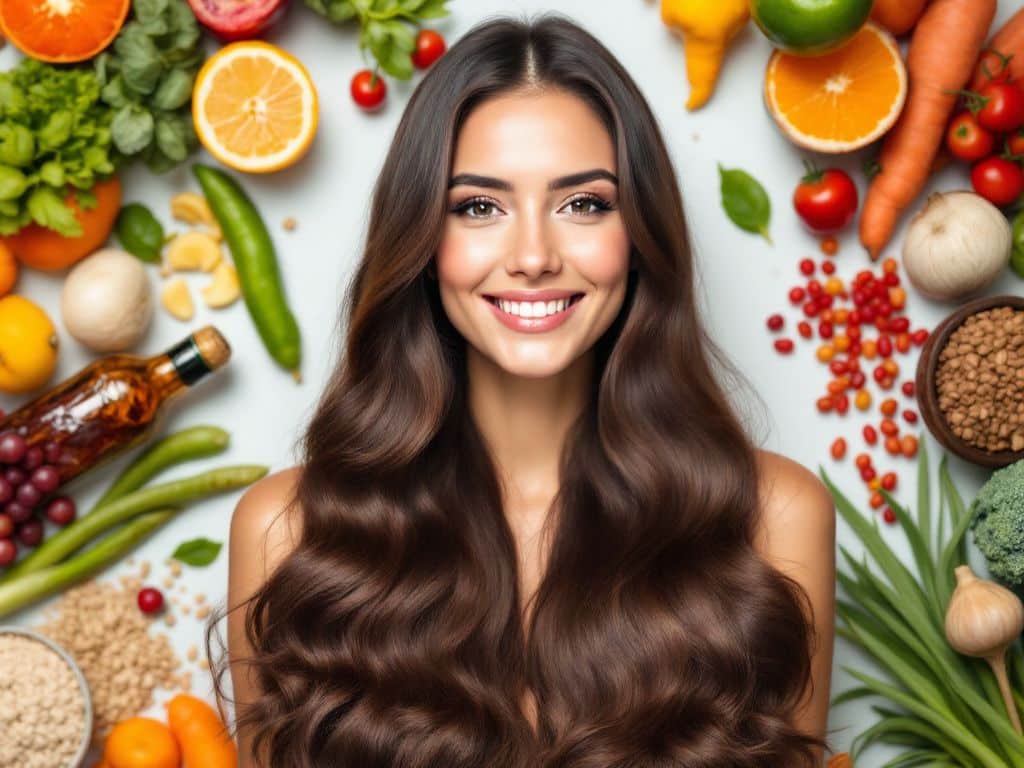
When it comes to achieving luscious, healthy hair, understanding the science of nutrition is crucial. Hair health is meticulously linked to what we consume, echoing the adage, “You are what you eat.” Like any other part of the body, our hair requires specific nutrients to flourish. Whether you’re an industry professional or a curious reader wanting more robust tresses, this in-depth guide on hair nutrients and diet for hair health dissects the science that underpins vibrant head-turning locks.
Unveiling the Secrets of Hair Health
Eating for our hair is much more than buying the latest supplement or trending hair oil. Although hair appears simple, it’s biologically one of the most complex parts of our bodies. As hair follicles are incredibly metabolically active, their need for oxygen and nutrients thrives under healthy eating patterns. 🚿 Let’s examine the key components—from proteins to micronutrients—and how they interact to influence every hair type and texture.
A Deep Dive into Hair Nutrients
In order to build up and maintain exuberant hair quality, here are must-have nutrients supported by nutrition science and detailed recommendations for inclusion in your daily diet:
1. Protein: The Building Block of Hair
Hair strands are primarily composed of keratin, a type of protein. Without protein, the growth cycle can rest prematurely, leading to hair thinning and loss.
- Sources: Lean meats, fish, eggs, dairy products, legumes, nuts, and seeds.
- Research Insight: A study published in the journal Clinical Nutrition underlines that protein-deficient diets may lead to shedding and less optimal hair coverage. 🐟
- Practical Tip: Ensure your intake is diversified. Implement foods like quinoa which not only provide a full amino acid profile but are also versatile for recipes.
2. Vitamins: Essential Micro-Wonders

Vitamin A
- Role: Essential for cell growth—including hair.
- Sources: Carrots, sweet potatoes, spinach, and kale.
- Data Backing: An inadequate supply can dry out the scalp, impacting healthy mane maintenance.
B-Vitamins (Biotin Special Highlight)
- Role: Biotin, noted for strengthening hair and thickening its density.
- Sources: Whole grains, almonds, fish, and dark leafy greens. 🍞
- Industry Standard: Dermatology recommendations often prescribe biotin for fragile, breaking hair owing to its impressive results shown in clinical interventions, as supported by data from the Journal of the American Academy of Dermatology.
Vitamin C
- Role: Potent antioxidant that aids in collagen synthesis, vital for hair strength.
- Sources: Citrus fruits, strawberries, and peppers.
- Real-world Scenario: Those with low vitamin C can face dry, splitting hair; by ensuring optimal levels, you’d harness this vitamin’s potent protective capabilities.
Vitamin D
- Link with Alopecia: Research highlights that deficiencies in Vitamin D are tangentially linked to certain types of hair loss such as alopecia areata.
- Sources: Fortified foods, sun exposure, and fatty fish such as mackerel.
Vitamin E
- Role: Protects hair follicles against oxidative damage.
- Sources: Sunflower seeds, spinach, and almonds.
3. Minerals: The Groundwork of Growth

Iron
- Importance: Key role in red blood cell functioning, transporting oxygen to each part of the body including hair follicles.
- Sources: Red meat, lentils, spinach.
- Statistics: Women experiencing hair loss have found restoration after iron levels improved (study from The Journal of Nutrition).
Zinc
- Contribution: Integral for tissue growth and repair.
- Sources: Chicken, chickpeas, and oysters.
- Actionable Insight: Being aware of high-risk factors for zinc deficiency, especially in those adhering to plant-based diets, is crucial for maintaining healthy hair growth.
4. Omega-3 Fatty Acids: The Optimal Moisturizer
- Role: Nourish hair follicles promoting luster and elasticity.
- Sources: Walnuts, flaxseed oil, and salmon.
- Case Study: In research by Hair Sciences Institute, an increase in omega-3s was correlated with an enhancement in hair density and better scalp health. 🌊
Crafting a Well-Rounded Diet for Hair Health
By finding the balance between macronutrients and micronutrients, a healthy hair diet revolves around varied, whole-food plant sources enriched with omega-3 fatty acids, vitamins, and essential minerals. Add to that sufficient hydration, as dehydration can julienne those crucial hair-protective oils, and you’ll have the perfect concoction for a natural hair revolution.

Cutting Through the Noise: Misconceptions and Truths
Biotin Overemphasis
While essential, biotin overdose is not a remedy. Its true benefit lies in preventing existing deficiencies rather than acting as a panacea for all hair concerns.
Fat-Free Diet Pitfalls
Totally limiting healthy fats can cause you more harm than good since fatty acids are necessary for hair lubrication and avoiding dryness. The trick? Opt for unsaturated and essential fatty sources.
Science-Backed Recommendations
- A Balanced Plate: Ensure each meal contains a balance of protein, complex carbohydrates, and healthy fats.
- Food and Hair Supplement Cautions: Supplements may aid deficiencies. However, always consult with healthcare professionals before major incorporations.
- Routine Check-Ups: Annual blood work to assess your vitamin D, iron, and zinc can provide insights into your overall nutritional balance and prioritize areas needing adjustments.
Conclusion: Takeaways for Professionals and Passionates
Addressing hair nutrients and building a diet for hair health through a structured regime bolstered by scientific research is the cornerstone of improving hair texture and condition. While food provides hydrate and nourish properties, even brushing techniques, stress management, and hair care products largely contribute to the hair wellness equilibrium. So, rather than relying solely on salon interventions, embrace a nutritional blueprint that’s as compelling and transformational as your luscious locks themselves.
💡 Remember, a personal touch matters: Tailor these guidelines specifically to individual needs possibly even collaborating with diet specialists, ensuring sustainable and long-lasting modifications. In the grand scheme of hair health, it’s a collaborative symphony of science, nature, and your very own resilience.
Frequently Asked Questions
What are the benefits of using a hair mask in my hair care routine?
Using a hair mask can provide several benefits, including hydration, smoothing, strengthening, curl definition, heat protection, and damage repair. Hair masks infuse the hair with moisture, help coat the hair shaft to seal split ends, reduce breakage, and protect the hair from heat styling and environmental damage[1][4].
What ingredients should I look for in a hair mask?
Effective hair masks often include ingredients such as coconut oil, argan oil, shea butter, honey, avocado oil, green tea, and coconut water. These ingredients provide nourishment, moisturize, and protect the hair, offering benefits like softening, moisturizing, and protecting against damage[2][5].
How often should I use a hair mask in my routine?
You should use a hair mask whenever your hair feels dry, unmanageable, or in need of intense hydration. This can vary depending on your hair type and needs, but generally, using a hair mask once or twice a week can help maintain healthy and moisturized hair[1][4].
How do I apply a hair mask for the best results?
To apply a hair mask effectively, shampoo your hair first, then apply the mask, focusing especially on the ends where hair tends to be the most damaged. Leave the mask on for anywhere from 10 minutes to overnight, depending on the type of mask and your hair’s needs[1][4].
References


Leave a Reply